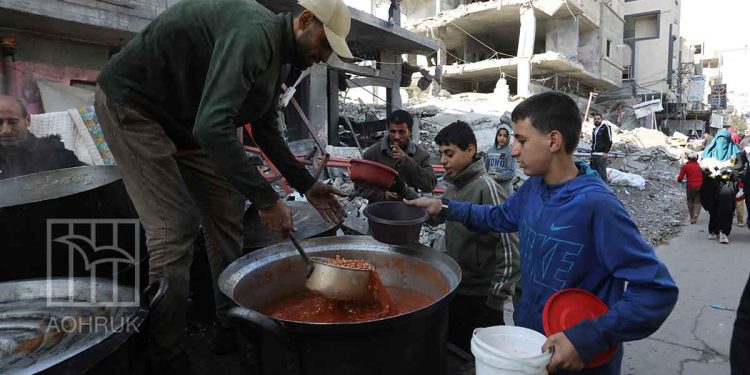The Israeli occupation uses a collective punishment policy against the Palestinians by starving them, and where Gaza is witnessing an unprecedented level of hunger that constitutes “genocide”, according to the United Nations Special Rapporteur on the right to food, Michael Fakhri.
He warned of the repercussions of an Israeli ground invasion of the city of Rafah in the southern Gaza Strip, and the resulting humanitarian catastrophe.
“Even before forces moved to Rafah, we were raising the alarm that every single person in Gaza was hungry”, he added.
He continued that under the developments in Gaza, the Israeli attacks and blockade, “at least one-quarter of the population was starving, and that famine was imminent”.
He pointed out that several countries have decided not to fund the most important humanitarian agency in Gaza but all Palestinian refugees and that is under war, the United Nations Relief and Works Agency for Palestine Refugees (UNRWA).
He stated that the Israeli forces pressing into Rafah squeezing hundreds of thousands of people into such a small concentrated area, which would exacerbate the famine.
The UN rapporteur said that he could not describe how difficult the inhumane situation in the Gaza Strip was. “Before we were saying famine is imminent. I would not be surprised by the end of the month that we will say that there is actually a full-blown famine”.
He stated that no one knows how long the people of Gaza can withstand this situation, as the aid reaching them is insufficient to keep them alive.
Fakhri warned that the problem with hunger is that it is “a long, slow and painful violent. Which means we are going to see the impact of this for months, years, and decades to come.”
He added, “Even if there is a cease-fire today, already the impact is affecting generations because so many children have been affected. So, the key thing to remember is that over 1 million children live in Gaza, and so their future is at stake. What we know is that children under fire — this is 335,000 children — are at the risk of permanent physical and cognitive impairment.”
Continuing to draw the tragic picture in the Gaza Strip, Fakhri said that the Israeli occupation authorities prevent humanitarian aid from reaching the Strip, while Israeli settlers also participate in this prevention.
He warned that the current level of hunger in Gaza has not been witnessed before, as we have never seen an entire people suffering from hunger, referring to the Strip’s population of more than 2.2 million people.
He pointed out that the suffering of the people of Gaza is not limited to the occupation preventing the access of humanitarian aid, but it is also implementing policies aimed at destroying the food system of the Strip, which hinders the ability of Palestinians to feed themselves.
Fakhri said that targeting Palestinian civilians, including depriving them of food, is part of a deliberate Israeli policy of targeting all Palestinians, as many occupation officials have repeatedly made statements indicating this.
In this regard, he referred to a statement by Israeli Defence Minister Yoav Galant, on October 9, 2023, in which he announced that he had ordered the imposition of a comprehensive siege on the Gaza Strip.
The Hebrew “Channel 13” back then had quoted Gallant as saying during an assessment meeting in the IOF’s Southern Command (which includes Gaza): “We impose a complete siege on Gaza City. No electricity, no food, no water, no fuel. Everything is closed. We are fighting human animals, and we are taking action accordingly”.
The UN rapporteur considered the statements of official bodies and individuals in Israel as an indicator that their intention is ethnic cleansing, as they intend to expel all civilians from Gaza and punish them all.
He stressed that this war has nothing to do with self-defence or the Hamas attacks (on the settlements adjacent to Gaza) on October 7, warning that the occupation’s goal is to punish all Palestinians simply for being Palestinians.
Fakhri emphasised that these practices constitute a genocide according to international law, human rights, and a moral perspective, as the intentions and actions of the occupation authorities are very clear about it.
The UN rapporteur stressed the importance of imposing sanctions on the Israeli occupation through the United Nations and the multilateral system, and the need to limit the supply of weapons used to violate human rights and commit genocide crimes.






























